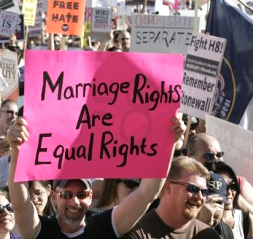 By: Bernadette Stark, Esq.*/Special to TRT–
By: Bernadette Stark, Esq.*/Special to TRT–
The country has been riveted this week as the United States Supreme Court heard oral arguments in two cases directly affecting LGBT individuals and families. At stake is federal recognition for same-sex marriages, as well as whether or not California will be the 10th state (plus the District of Columbia) to allow gays and lesbians to marry. The constitutionality of both the federal Defense of Marriage Act (DOMA) passed in 1996 and Proposition 8, a California voter-initiative which repealed legal same-sex marriage in California, are being challenged before the Supreme Court.
In Hollingsworth v. Perry, the Court addressed the constitutionality of Proposition 8, which was passed by a narrow margin of Californians (52 to 48 percent voted in favor of it). Proposition 8 repealed a decision by the California Supreme Court which legalized same-sex marriages in the state. Following a two-week trial in 2010, Federal District Court Judge Vaughn Walker issued a sweeping decision declaring Proposition 8 unconstitutional. He wrote that preventing gay and lesbian marriages violated equal protection under the law guaranteed by the U.S. Constitution. The Ninth Circuit Court agreed and also struck down Proposition 8. That’s the big question the U.S. Supreme Court can address in this case. But there’s also another legal issue: since the state of California refused to defend Proposition 8, its supporters are carrying on the appeal. Many legal observers think that the supporters do not have standing to carry on the appeal and that the Supreme Court will dismiss the case without ever answering the big question of equal protection. That would leave Judge Walker’s 2010 decision intact – and Proposition 8 would be considered unconstitutional, opening the way up to same-sex marriages in California. However, if the Court chooses this path, the effect of the Court’s decision could be limited to California, unless it addresses the equal protection arguments.
The case heard on Wednesday, March 27th, Windsor v. United States, provides a direct attack on DOMA, Section 3, which is the part of the law that defines marriage as between a man and a woman for the federal government’s purposes. That case involves an 84 year-old widow from New York, Edie Windsor. Ms. Windsor’s wife of 5 years, but partner for over 40 years passed away in 2009. Had her partner been a man, she would have paid nothing in estate taxes. However, since her spouse was a woman, the federal government, because of DOMA, did not recognize her marriage and she was billed over $363,000 in federal estate taxes. She filed a lawsuit in federal court challenging DOMA, which she won at both the district court and the circuit court level, when both courts declared that DOMA was unconstitutional. Since then, the Department of Justice issued a statement explaining that it could no longer defend DOMA’s constitutionality and it stopped defending the law in Court. Later, the Bipartisan Legal Advisory Group of the House of Representatives (BLAG), intervened in the suit “for the limited purpose of defending the constitutionality of Section 3” of DOMA. With a standing issue – can BLAG pursue this action? Also, since the United States, under the Obama administration, agrees with the Circuit Court’s decision that DOMA is unconstitutional, can the Supreme Court even hear the case since both of the “aggrieved parties” (the United States and Windsor) agree that DOMA is unconstitutional? Once again, the Supreme Court could choose to avoid the larger question of equal protection for gays and lesbians and decide the standing and jurisdiction issues.
Although there is no way to tell how the Court will rule simply by the questions they asked, there were several significant moments, which might give some clues on how the justices perceived the case. Most court observers were keeping a close eye on Justice Kennedy, who is usually the “swing vote” on close issues and who has historically sided with the more liberal justices on cases affecting LGBT rights. He appeared persuaded that DOMA intruded into the power of the states to regulate marriage, to which the federal government must usually defer. At one point during oral arguments in Windsor, Kennedy also noted that the federal government was “intertwined with citizens’ daily lives” as a result of DOMA and he questioned Congress’ authority to pass such a broad law. If Kennedy does side with the four liberal justices, who all seemed poised to strike down DOMA, then we could see the end of this law and the beginning of federal recognition for same-sex marriages. This would not allow same-sex marriages in states where it is currently prohibited, nor would it necessarily require those states to recognize marriages from other states where it is legal (unless the court’s language is broad and addresses the equal protection arguments).[pullquote]Although there is no way to tell how the Court will rule simply by the questions they asked, there were several significant moments, which might give some clues on how the justices perceived the case. Most court observers were keeping a close eye on Justice Kennedy, who is usually the “swing vote” on close issues and who has historically sided with the more liberal justices on cases affecting LGBT rights. [/pullquote]
If Section 3 of DOMA is struck down by the Supreme Court, how will it affect those in same-sex marriages where it is recognized by the state (as in Massachusetts, New York and Connecticut)? It would finally allow same-sex couples in legal marriages to be treated equally with respect to social security, taxes, health insurance, immigration and over 1,100 federal benefits and programs which are marriage-based. These couples would be able to receive a social security benefit if one spouse passed away. They could be able to inherit from a spouse without estate taxes being applied. They could sponsor a same-sex fiancé for a visa to the United States and sponsor him or her for lawful permanent residency, allowing them to live in the United States together. There are hundreds of ways families would benefit financially and otherwise with the repeal of Section 3 of DOMA. Unfortunately, LGBT families would still have to engage in extra legal planning if the Court does not adopt the equal protection arguments regarding gays and lesbians because same-sex marriages would still not be recognized in many states. As a result, if you travel or move to a state where same-sex marriages aren’t recognized, you could still be at risk. Therefore, I would still advise same-sex couples to engage in estate planning with an attorney who is experienced in DOMA and LGBT family law issues. Health care proxies, powers of attorney and second-parent adoptions may still be advisable, even if Section 3 of DOMA is struck down. Therefore, you should consult with an attorney to discuss these issues if you are in a same-sex marriage.
It is clear that this is a historic opportunity for the Supreme Court to address the history of discrimination and inequality faced by LGBT Americans. “Marriage is a vital social institution,” wrote Chief Justice Margaret H. Marshall in the Goodridge v. Department of Public Health decision (which legalized same-sex marriages in Massachusetts). “The exclusive commitment of two individuals to each other nurtures love and mutual support; it brings stability to our society.” The “marriage ban” the court held, “works a deep and scarring hardship” on same-sex families “for no rational reason.” In both Hollingsworth and Windsor, the Supreme Court has an opportunity to affirm the dignity and equality of all individuals, and to halt the perception of LGBT individuals and relationships as “second-class.”
*Bernadette Stark is an attorney who practices in Family Law/Domestic Relations with a concentration in LGBT issues. She is a founder and partner at the law firm of Dinsmore Stark, Attorneys at Law, which has a principal office in Northampton, Massachusetts. She can be reached at 413-341-3639 or bstark@dinsmorestark.com.







